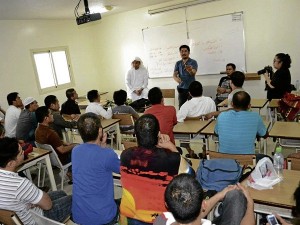PH labor agency neglects own workers overseas

PATNUBAY volunteer Joseph Espiritu speaks before Muslim Filipinos at the Dawa Center in Riyadh where he was invited to talk on the rights and obligations of overseas Filipino workers (OFWs) in Saudi Arabia. He charges the Philippines own overseas labor office of not being fair to its own employees. Patnubay photo
JEDDAH—In October 2009, a Filipino migrant worker suffered a stroke and was confined at the Shumesy Hospital in Riyadh. He later developed complications, including kidney failure, and needed dialysis.
Because he had no medical insurance and the family did not have enough savings to spend for the rising hospital bills, his coworkers had to pitch in whatever amount they could spare to help defray the cost of his expensive treatment.
He died at the hospital a month later in what the family felt was a humiliating death. His son, who is still in Riyadh, has requested that his late father not be named “in respect to the memory of his father who is already in his resting place.”
His father was not your typical overseas Filipino worker (OFW) who was neglected by a private employer.
Ironically, he was locally hired by the Philippine Overseas Labor Office (Polo)in Riyadh.
PH gov’t employees
“However you look at it, he was an employee of the Philippine government,” says Joseph Espiritu of the Riyadh-based advocacy group Patnubay. “But he was locally hired and did not have the same privileges as the regular staff.”
Patnubay, which has been helping distressed OFWs in Saudi Arabia, has taken up the cudgels for the locally hired Polo employees who are working under the umbrella of the Philippine diplomatic missions across the kingdom.
The group, which is run by OFW volunteers, decided to help them because the workers themselves are afraid to lose their jobs if they complain openly. Many of them have been with Polo for more than 10 years.
Funds needed
In 2009, Patnubay took their plight to the attention of several government agencies, including the Philippine Overseas Employment Administration (POEA) and the Overseas Workers Welfare Administration (Owwa).
Last year, the Manila-based Center for Migrant Advocacy (CMA) headed by Ellene Sana referred the case to the Department of Labor and Employment (DOLE), which has asked Congress to approve a P130-million fund for the medical insurance and benefits of the “local-hire” Polo workers overseas because it allegedly did not have funds for that purpose.
The case has been in limbo since then.
What irony
“It is ironic that a government agency created to help OFWs cannot even be fair to its own employees overseas. This is akin to a private employer exploiting its workers,” laments Espiritu, who believes that the same situation prevails in other Middle East countries where Polo has offices.
“So the question arises: If the Philippine government cannot protect—or at least be fair—to its own employees abroad, how can it protect OFWs working in the private sector in other countries, particularly in the Middle East?”
Patnubay has no figure on how many Polo employees are hired locally, but Espiritu calculates that it is more than half of the total Polo work force. “And they are more experienced than the regular staff who are changed every now and then,” he added.
Polo violating labor laws?
Patnubay proposes benefits for the locally hired Polo workers similar to those given by employers in Saudi Arabia’s private sector under the Saudi labor law: Medical insurance of at least SR100,000, overtime pay and end-of-service benefits equivalent to one-half month every year for the first five years and one month for every year thereafter.
“If our government cannot treat the locally hired workers as its own, then it must treat them as OFWs working in Saudi Arabia,” said Patnubay in its letter sent to government agencies in 2009. “It should give them the benefits imposed by the Saudi labor law on the private sector.”
Last year, Ambassador to Saudi Arabia, Ezzedin Tago, who was then charge d’affairs, commented in the Patnubay website that the plight of the locally hired Polo employees was an old problem which the agency should have resolved a long time ago.
Unresolved issues
“This is such an old issue and I personally do not understand why it has not been resolved … The Polo LHEs (locally hired employees) should be accorded the same rights (as the OFWs) under the Saudi Labor Law,” he said in his comment.
This week, Patnubay reported another locally hired Polo employee has been confined at the King Khalid Hospital in Riyadh. Like other workers locally hired by the agency, the employee, identified only by his first name Abdulrahman, the one who handles OFWs’ complaints against their employers, has no medical insurance.
Rights and dignity
This brings back the memory of the Polo worker mentioned above whose family felt that he had suffered such injustice and humiliation in his death bed after working at the Polo office in Riyadh for more than 15 years.
A few days before he died,Polo officials reportedly registered him as an Owwa member, meaning they made him appear like a regular OFW and paid the $25 mandatory OFW contribution to OWWA for that year so that his family could get benefits of at least P100,000—after his death.